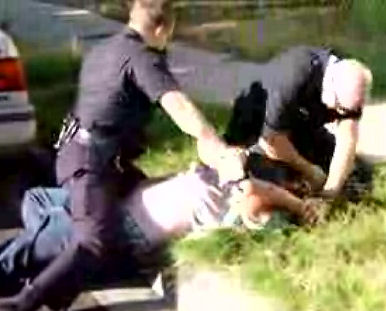

Question: If the parties being recorded have to consent, does that mean if I don’t consent to being photographed or videoed by the ubiquitous street cameras operated by the city that I can sue and/or have the operators and city officials who had them installed arrested?
In response to a flood of Facebook and YouTube videos that depict police abuse, a new trend in law enforcement is gaining popularity. In at least three states, it is now illegal to record any on-duty police officer. Even if the encounter involves you and may be necessary to your defense, and even if the recording is on a public street where no expectation of privacy exists.
The legal justification for arresting the “shooter” rests on existing wiretapping or eavesdropping laws, with statutes against obstructing law enforcement sometimes cited. Illinois, Massachusetts, and Maryland are among the 12 states in which all parties must consent for a recording to be legal unless, as with TV news crews, it is obvious to all that recording is underway. Since the police do not consent, the camera-wielder can be arrested. Most all-party-consent states also include an exception for recording in public places where “no expectation of privacy exists” (Illinois does not) but in practice this exception is not being recognized.
[…]
Almost without exception, police officials have staunchly supported the arresting officers. This argues strongly against the idea that some rogue officers are overreacting or that a few cops have something to hide. “Arrest those who record the police” appears to be official policy, and it’s backed by the courts.
[…]
When the police act as though cameras were the equivalent of guns pointed at them, there is a sense in which they are correct. Cameras have become the most effective weapon that ordinary people have to protect against and to expose police abuse. And the police want it to stop.
Found by Brother Uncle Don















>> Anon said, on June 7th, 2010 at 2:41 am
>> Three VERY liberal states. Figures. Liberals hate the Constitution.
What a jackass thing to say — especially after conservatives collectively crapped on the constitution in their panic after 911.
Officers behaving badly are fair photo subjects. Their color of authority does not preclude their behavior being documented by anyone who wishes to make such a recording.
A recording of suspected poor behavior is a recording of public officials acting in public. Gray area: Cops on private property. But the cop in question is not his own personal private property. His public role trumps his personal privacy. Hands down.
They may, however, issue an order to share the footage with the Police Department legal staff, and may stridently request that of the photographer, to prevent legal blindsiding.
It’s going to take a Supreme Court case to establish this, I think.
#9 Actually Dallas its just the Nanny State in action. They have the same thing in England and no doubt other Nanny States.
Let me explain how the game works. You want to do testing that basically shows that everybody is learning more now than in the past and keep doing this year after year because the law says you must. People aren’t getting smarter so how do you do that?
After some point I think you do that by only allowing government employees and students to look at the tests then firing any government employee that admits they saw anything at all relating to the test much less noted something they thought was peculiar or wrong.
Since everyone that might be in a position to actually know anything either doesn’t or is afraid to admit they saw something questionable you can do what you want to get the scores you need and if some of the test was pure crap who is going to be the wiser? The people scoring the things can do anything.
Let me explain how I think you can tell which states are _extremely_ corrupt. Any state that has a law saying you can’t record officers doing their jobs in public places is on my list of extremely corrupt states.
>> # 34 Buzz said, on June 7th, 2010 at 6:48 pm
>> It’s going to take a Supreme Court case to establish this, I think.
Police are public servants serving the taxpayer oten working in public spaces.
It seems obvious that video taping of them should be allowed but you are probably right about the Supreme Court.
# 35 deowll:
“[…] Any state that has a law saying you can’t record officers doing their jobs in public places is on my list of extremely corrupt states.”
Agreed.
When cameras are outlawed, only the police outlaws will have cameras.
Suggestion:
Make video recorded on public cameras available as public record.
If you’re going to record the police, use a camera that can stream to the internet via qik. That way you don’t lose your footage when they confiscate your equipment and arrest you.
That’s not right. It’s so stupid, that’s like us saying we want places to stop putting up cameras so they can’t catch us doing something illegal. If the cop is truely only doing his job, he wouldn’t care if someone was recording him. For instance, a store sets up cameras to assure that their merchandise isn’t stolen, right? So how is it wrong for someone to want to have a video of the police arresting them, to make sure they don’t abuse their rights to a point where it’s considered assault? They are the same thing, so I think people have every right to record videos of stuff like that.